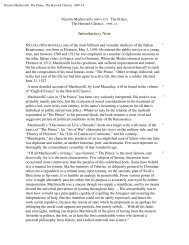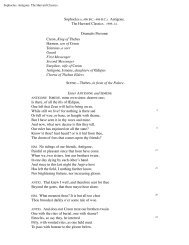Notre Dame de Paris - Bartleby.com
Notre Dame de Paris - Bartleby.com
Notre Dame de Paris - Bartleby.com
You also want an ePaper? Increase the reach of your titles
YUMPU automatically turns print PDFs into web optimized ePapers that Google loves.
woes.<br />
The respite was short. The female voice which had interrupted the gipsy’s dance now broke in upon her<br />
song:<br />
“Silence, grasshooper of hell!” she cried out of the same dark corner of the Place.<br />
The poor “cigale” stopped short. Grainier clapped his hands to his ears.<br />
“Oh!” he cried, “accursed, broken-toothed saw that <strong>com</strong>es to break the lyre!”<br />
The rest of the audience agreed with him. “The foul fiend take the old sachette!” growled more than<br />
one of them, and the invisible spoil-sport might have had reason to repent of her attacks on the gipsy, if<br />
the attention of crowd had not been distracted by the procession of the Pope of Fools, now pouring into<br />
the Place <strong>de</strong> Grève, after making the tour of the streets with its blaze of torches and its <strong>de</strong>afening hubbub.<br />
This procession which our rea<strong>de</strong>rs saw issuing from the Palais <strong>de</strong> Justice had organized itself en route,<br />
and had been recruited by all the ruffians, all the idle pickpockets and unemployed vagabonds of <strong>Paris</strong>,<br />
so that by this time it had reached most respectable proportions.<br />
First came Egypt, the Duke of the Gipsies at the head, on horseback, with his counts on foot holding his<br />
bridle and stirrups and followed by the whole gipsy tribe, men and women, pell-mell, their children<br />
screeching on their shoul<strong>de</strong>rs, and all of them, duke, counts, and rabble, in rags and tinsel. Then came the<br />
Kingdom of Argot, otherwise all the vagabonds in France, marshalled in or<strong>de</strong>r of their various ranks, the<br />
lowest being first. Thus they marched, four abreast, bearing the divers insignia of their <strong>de</strong>grees in that<br />
strange faculty, most of them maimed in one way or another, some halt, some minus a hand—the<br />
courtauds <strong>de</strong> boutanche (shoplifters), the coquillarts (pilgrims), the hubins (housebreakers), the<br />
sabouleux (sham epileptics), the calots (dotards), the francs-mitoux (“schnorrers”), the polissons (street<br />
rowdies), the piètres (sham cripples), the capons (card-sharpers), the malingreux (infirm), the<br />
marcandiers (hawkers), the narquois (thimble-riggers), the orphelines (pickpockets), the archisuppôts<br />
(arch-thieves), and the cagoux (master-thieves)—a list long enough to have wearied Homer himself. It<br />
was not without difficulty that in the middle of a conclave of cagoux and archisuppôts one discovered the<br />
King of Argot, the Grand Coësre, huddled up in a little cart drawn by two great dogs. The Kingdom of<br />
Argot was followed by the Empire of Galilee, led by Guillaume Rousseau, Emperor of Galilee, walking<br />
majestically in a purple, wine-stained robe, prece<strong>de</strong>d by mummers performing sham-fights and<br />
war-dances, and surroun<strong>de</strong>d by his macebearers, his satellites, and his clerks of the exchequer. Last of all<br />
came the members of the Basoche with their garlan<strong>de</strong>d maypoles, their black robes, their music worthy<br />
of a witches’ Sabbath, and their great yellow wax candles. In the center of this crowd the great officers of<br />
the Con fraternity of Fools bore on their shoul<strong>de</strong>rs a sort of litter more loa<strong>de</strong>d with candles than the<br />
shrine of Sainte-Genevieve at the time of the plague. And on it, resplen<strong>de</strong>nt in cope, choosier, and miter,<br />
sat enthroned the new Pope of the Fools, Quasimodo, the hunchback, the bell ringer of <strong>Notre</strong> <strong>Dame</strong>.<br />
Each section of this grotesque procession had its special music. The gipsies scraped their balafos 26 and<br />
banged their tambourines. The Arguers—not a very musical race—had got no further than the viola, the<br />
cow horn, and the Gothic rebel of the twelfth century. The Empire of Galilee was not much<br />
better—scarcely that you distinguished in its music the squeak of some primitive fiddle dating from the<br />
infancy of the art, and still confined to the relax. But it was round the Fools’ Pope that all the musical<br />
treasures of the age were gathered in one glorious discordance—treble rebels, tenor rebels, not to










